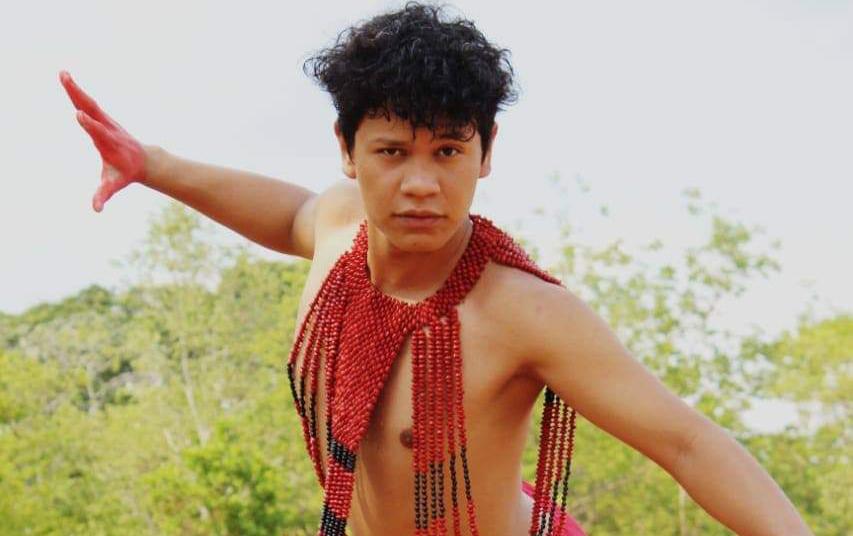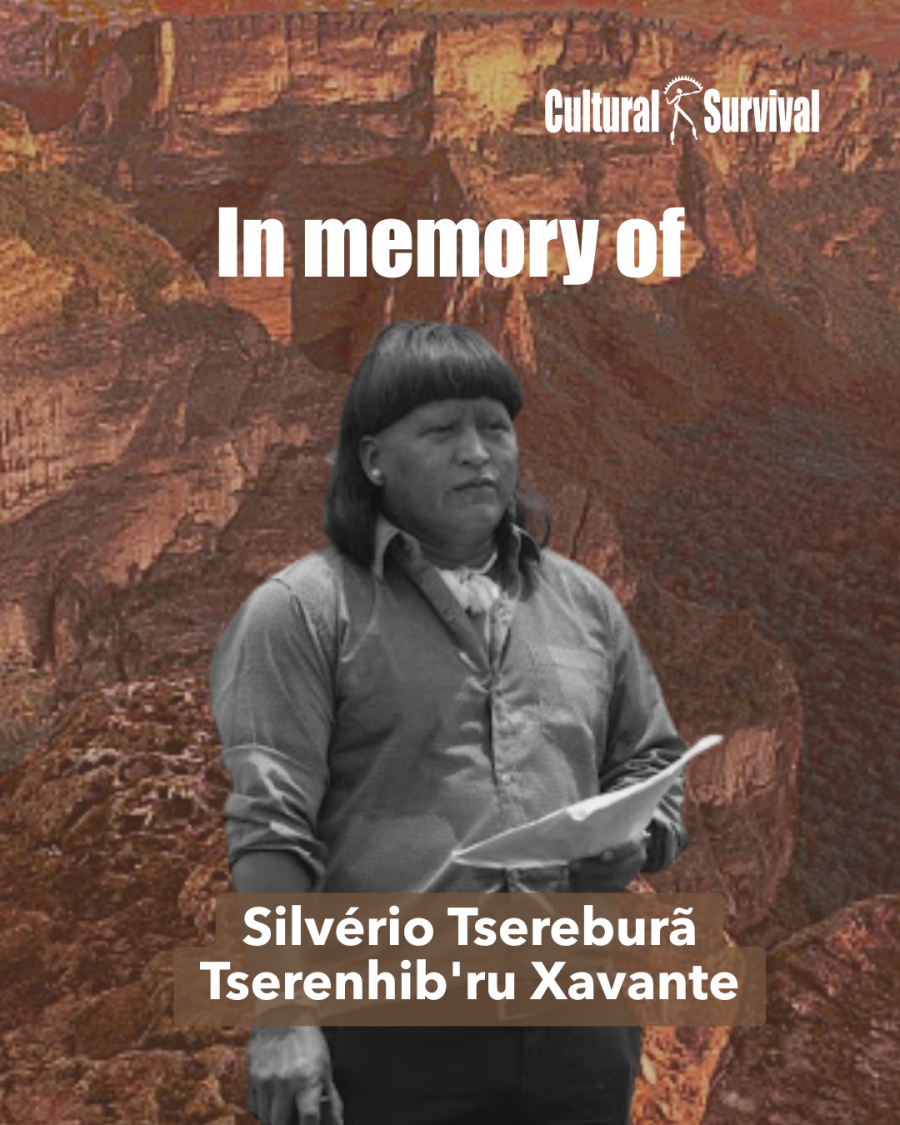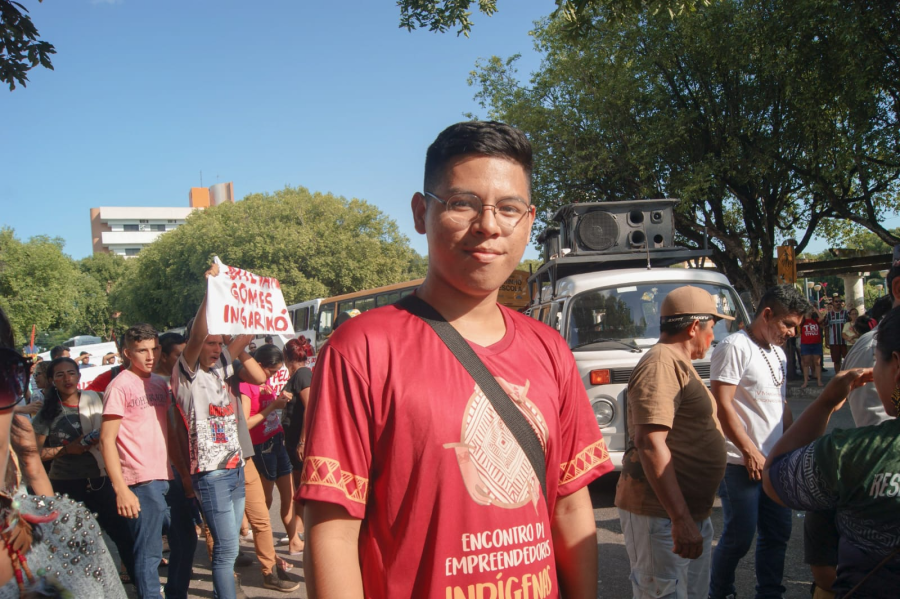
Jônatas Robson Simões Moreira (Terena), 26, is from Aldeia Lagoinha, Aquidauana, Mato Grosso do Sul, Brazil. He is a public school teacher with a degree in performing arts and dance from the State University of Mato Grosso do Sul, and is currently pursuing a graduate degree in dance and education. He is an artist, a choreographer, and an activist for Indigenous causes. Nati Garcia (Maya Mam), Cultural Survival Capacity Building Manager, recently spoke with Robson.
Nati Garcia: How do you identify in Brazilian and Indigenous language contexts?
JRSM: I shape myself in society and where I live. [Human beings have] these necessary constructs. From this construction of myself as a person, I identify as he/him. Even though in Brazil there are other pronouns emerging like todes (gender neutral for ‘everyone’) to uplift the issues of transgender people and to highlight [2SLGBTQIA+] issues, it is a question in relation to the thought of how to deconstruct in order to construct.
The Portuguese language does not belong to Brazil; it is a borrowed language. Let's say that the national Brazilian language would be that of Indigenous Peoples. As we speak of pronouns, people, Brazil, language...it is a construction, a deconstruction, it needs to be analyzed. When I speak of these questions about the Brazilian language, it gives visibility to Indigenous mother languages. Today in my Indigenous community, all schools need to work in the Terena language, art, and culture. Just here in our state we have this diversity of Peoples and languages—Caudiuéus, Quininaus, Guarani-Kaiowá, Aticun, Guató.
NG: In your language, do gendered pronouns exist?
JRSM: I have to tell the history of the Terena people to answer this question. Our people were colonized, and we are still influenced by Christian and European thinking, by the standards imposed on us. A specific name that is used to refer to someone who is homosexual is an animal term, which is also a reference to deer. But this is white thinking. Indigenous people started to adopt these cultural things and impose them within our community. They use the word tipé, which is the deer in our Terena language, to identify a person. This is one of the problems that we as teachers and artists want to debate, because this is not the way I treat a person. Independent of sexuality, independent of gender, you are talking about an animal, and we are not animals. We have to think about decolonizing this type of white thought that is imposed. White people see it in a prejudiced way. There are other pronouns that are not used. Women have a name so you can identify a woman who is a lesbian. A man that is homosexual, a gay man, they call ‘a man that wants to be a woman,’ and for a woman, ‘a woman that wants to be a man.’ In the Terena language, these are the two words.
Terena people have had many transformations in relation to cultural issues. Certain words have been dormant. We are going to work in relation to the Terena language and research many things that will transform future thought. I am always policing myself for being this person that is in education, always thinking about what I say because I believe that children observe us.
NG: Please share some of your experiences about your journey, family, and community.
JRSM: I am the son of a preacher and the son of a teacher. My father is Indigenous, my mother is Black. I lived in a Christian environment until I found what was right for me. My parents never said no to me, both in my formation as an artist and in professional issues. They never interfered, they were always supportive. They never judged. But there was always a barrier in terms of the future because Christians think about the afterlife, heaven and hell, and they always ask questions about right and wrong. By first understanding yourself as a person, you can also help other people. I always had this thought of ‘how can I help my neighbor?’ In my interaction with other people, even with my brothers, I was demystifying, breaking some barriers in the issue of speech. So many things still need to change.
My community is also formed by Christian standards. Many people belong to the church and do not leave this environment because they are repressed and ignored by society. They are not well spoken of, because if you are different, you cannot be part of this world. That's their thinking. Someone being different bothers them. We are also always focusing on the issue of criminalization of homosexuality, femicide, murders of [2SLGBTQIA+] people.
It is only through respect that I can bring these individualities in. Respect needs to be the priority within our society. No matter how much you have an opinion, how much you think, how much you are this or that, it is through the path of respect that I understand the other. It is not about seeing differences and embracing, but understanding that the other and his individuality will not affect me. We are always deconstructing thoughts, decolonizing knowledge, reverberating and awakening thinking so that these people become conscious.
NG: Please tell us about the current state of 2SLGBTQIA+ rights and movements in Brazil.
JRSM: Everything is still new to me in terms of those spaces. Regarding the [2SLGBTQIA+] movements, I have never participated. But I know people who are bisexual, heterosexual, lesbian, gay, trans, people who [identify as] non-binary. This is an environment that I am now getting a little bit more used to because I am also now understanding and realizing who I am in society. I think that we as people need to build ourselves from fragments. In relation to the movement, during Pride Month here in Campo Grande there was a gay pride parade, and we had a round of conversations with people from universities about quota issues.
Our conservatism in Brazil is very extremist. So many times people are built within this limited thinking because they don't open up to other things. In Brazil, we have a huge border with other countries. Besides the Indigenous people, we have the Blacks; our cultural diversity is multi, our ethnic diversity is multi. The public policies aimed at [2SLGBTQIA+]...I have been getting very close and I still want to get closer, because this is something that I have put in the minds of my students. It's about respect; it is to understand these differences on a horizontal plane, not on a vertical plane, because when we place them vertically, we only want to place one thing above the other. And that's not it. Our society is not the first, second, third, one better than the other. No, it needs to be on this horizontal plane.
NG: Please tell us about your path to figuring out your identity. How has this journey been for you?
JRSM: There are countless things that we go through in our lives, psychologically and physically. I have a lot of baggage in the sense of living with my own family. I think that people who talk [publicly] about [2SLGBTQIA+] struggles, that is very important. Both in films and in the news, I believe that these are tools that strengthen with messages like ‘you are not alone,’ ‘you don't have to suffer silently.’ These tools also helped me.
[2SLGBTQIA+] artists...I don't have a [single reference point], ‘that person over there is someone that helped me.’ I believe that there are countless people that echoed around me and it is from this thought that I also have to make people have this self-esteem, to get out of that [self-imposed] prison. Because many people still live in this prison: ‘I won't take a step here because I am afraid of rejection.’ ‘I will not take a step here because I am afraid of being judged, of being oppressed, of being rejected by the community where I live.’ But from 2010 on, Brazil has changed a lot regarding issues of respect. I remember the punk bands that used to wear colorful clothes—many people were offended simply because they were wearing colorful clothes and not even because of their sexuality. Lady Gaga is one of the artists that I get a lot of inspiration from in relation to this confrontation of putting my life on the line and how I play with other people, not in the sense of defeating them or despising them, but in the sense that I don't need to be always confronting them. It is a game against prejudice, it is a game against racism, it is a game against this lack of knowledge, not a game against others. It is a game against the thoughts that are built into this society.
There is a veiled prejudice in the parents of some friends of mine that are from my community. It is not spoken about, it is not demonstrated, but it is from living together that these people open up to me. They don't make it explicit, but they always throw those implicit hints where I think I have to do something. Not in confrontation, but on the specific side of the person being in that toxic environment, to work so that it doesn't grow.
Thinking about the political issues that we are living today, with the extremism of the conservative and savage right wing that ignores and despises diversity and wants to segregate the minorities according to them, they say that we are the minorities. But I believe that when the favelas come out, when the villages come out, when the [2SLGBTQIA+] people come out, when the Black people come out, they will see that we are not the minority, but the majority that makes up this country.
NG: What are some upcoming projects you will be working on?
JRSM: My goal for the short term, until December, is to create a book about how to teach the Terena dance of several Peoples, in fact of several communities, of several villages, and to make a printed magazine. I am going to speak as a dance teacher. The Terena dance is not taught within our schools, but it is in the communities. How can I also think about that student that doesn't want to dance with the people anymore? It is thinking about inspiring this student who is not interested in dance, to bring this student to this understanding of the Indigenous Peoples’ cultural side. So, in the short term that is it, to teach Terena dance and work at various levels of education from elementary school to high school to youth and adult education for young people and adults who did not finish their education.
In the long term, [my goal] is to write another article talking about contemporary Indigenous dance: how can I talk about my body, bringing in cultural fragments through song and dance, and transform this into a dance performance? It is my dream to [produce] a dance show with only Indigenous dancers. As much as I have a background in drama, dance is my priority at the moment. I did my degree in performing arts because of dance, so I have a passion for dance, for the body.
I believe that knowledge will always be available when we put it into practice. Thank you very much indeed for this opportunity. I seek even more strength from the moment that I am talking to you. I see that there is a need for this to be spoken about, I need this to be felt in one way or another; I need to seek, I need to reach, I need to embrace things that may be close, and from that sensibility I can understand still more of myself.



